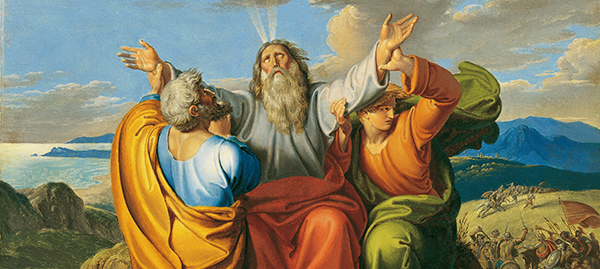
V/ I will turn to you O God,
R/ to God who gives joy to my youth
V/ Give me the Wisdom that sits by your throne;
R/ that I may be counted among your children
Lord, in your all-providential plan, you have led me to this moment to rediscover me in your Word and Wisdom. Aid me to make this time of meditation and prayer enriching, transforming, and liberating for my well-being and others. Amen!
AIM OF INTERCESSORY PRAYERS
By Vivien Foster, OCDS
29th Sunday in Ordinary Time, Year C
Exodus 17:8-13; Psalm 121(120):1-8; 2 Timothy 3:14-4:2; Luke 18:1-8
19th October 2025
“Ask and you will receive” (Matthew 7:7). We are all familiar enough with this teaching of Jesus on intercessory prayer. But our readings today, take this instruction a great deal further. To rephrase their central message in the same language, we might say something like: “If you wish to receive, you had better keep asking again, again, and again.”
This is what Moses does in our Old Testament reading, with his arms raised tirelessly in prayer for hours on end as Israel battles against the Amalekites. This is what the importunate widow does in our Gospel reading, as she bombards the unjust judge with her unrelenting petitions.
While intercessory prayer is perhaps the most widely practised form of prayer, there is something fundamentally puzzling about it when we stop to reflect.
While Jesus himself acknowledges that “your Heavenly Father knows what you need before you even ask” (Matthew 6:8). So, if a loving and omniscient God already knows our needs, why do we need to pray for anything beyond the fulfilment of his will? Instead of bombarding heaven with our personal preoccupations, should we not rather focus our prayer life on praise and adoration, while allowing God to take care of life’s daily needs according to his providential dispositions?
Indeed, the Carmelite saints, in particular St John of the Cross, encourage us to detach ourselves from grasping after all worldly and spiritual goods (Ascent of Mount Carmel, Sketch) and rather reorient our prayer lives towards a simple loving presence to and awareness of God (Dark Night, I.10.4).
Nonetheless, our readings today insist on the prayer of intercession. Perhaps the answer is that the importance of intercessory prayer lies not so much in the impact that it has on God, but rather in the effect that it has on us.
If we look more closely at the story of Moses praying over the battle with the Amalekites, we find that it takes place in the context of the Exodus. The Israelites have been wandering in the desert and—despite the portentous events leading up to their escape from Egypt—they are losing faith in God’s willingness and ability to provide for their needs (Exodus 16:2-3).
Moses’ prayer of intercession over the battle with the Amalekites then demonstrates very visibly to the people, that their very survival depends on their ability to rely on God. Everyone can see Moses sitting up there on the hill and observe that while his hands are raised, the Israelites have the upper hand in the battle, but when his hands begin to flag, the upper hand goes to the Amalekites.
In addition to bringing home our dependency on God, intercessory prayer educates our desires. It requires us to sort out what is worth asking for, what we really care about, and to demonstrate the intensity of our desire through assiduous prayer. This is what the importunate widow does through her repeated lobbying of the unjust judge in today’s Gospel parable. Ultimately, it prepares us to receive what God in his benevolent providence has disposed.
Thus, even in the prayer lives of the great Carmelite mystics, we find plenty of evidence of continuing intercessory prayer. Teresa of Avila is forever turning to God parenthetically, in the midst of her prolific spiritual writings, whether to make petition for the wider Church during the struggles of the Reformation (Way of Perfection, 1.2), or to plead for the establishment of her latest religious foundation (Book of Her Life, 32.10). More so, Thérèse of Lisieux is a master of intercessory persuasion on matters both great and small, whether to beg for the repentance of convicted criminals (Story of a Soul, A.V), or to lobby heaven for her whim that snow fall on the day of her religious clothing (Story of a Soul, A.VI).
While there is ultimately so much more to prayer than intercession, we nonetheless never fully outgrow it. For intercession places us in touch with our human contingency and has the power to move the compassionate heart of Our Father.
Daily Offering
Lord, I offer myself to you anew, in scaling the heights of Carmel by taking to heart your Word and Wisdom communicated through this time of meditation. May I be transformed into a prayer presence in the World. Amen
Questions for reflection:
• The reflection suggests that intercessory prayer “educates our desires.” Can you recall a time when praying persistently for something didn’t change the outcome, but it fundamentally changed you or clarified what you truly valued?
• Moses’ prayer was a visible sign of dependence for the entire community. How can our own “arms-raised” prayer, however personal, be a symbol of our family or community at prayer?
• This reflection frames persistence not as nagging God (who already knows our needs) but as a way to prepare us to receive what He has disposed. How does this change your view of “unanswered” prayer or prayers that take a very long time to come to fruition?
Suggested Exercise for the Week:
Explore ways to ‘unformalise” your prayers. Bring all your desires and your personal preoccupations or too small or “insignificant” concerns to God as would a friend.
Commit to Heart: Prayer Changes us!
